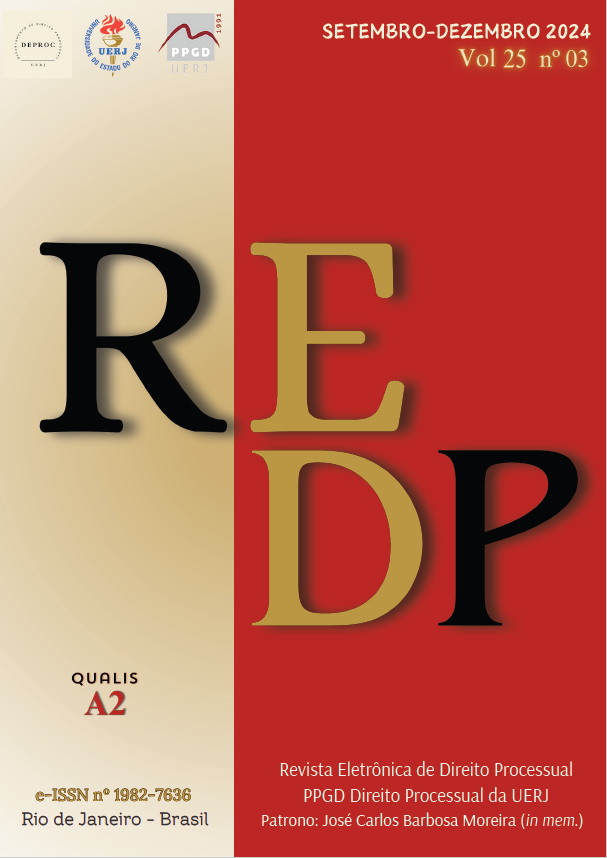COMPENSATION FOR DAMAGE CAUSED BY RUSSIA'S ARMED AGGRESSION AGAINST UKRAINE: PROSPECTS FOR EXTRAJUDICIAL RESOLUTION
DOI:
https://doi.org/10.12957/redp.2024.86619Resumo
(i) Antecedentes: O facto da invasão russa na Ucrânia, que resultou em perdas multimilionárias para o povo ucraniano, é bem conhecido. O dano foi infligido tanto ao Estado como a cada um dos seus cidadãos individualmente. Considerando o período de dez anos de agressão contínua e a sua escala, há um número obviamente grande de indivíduos dispostos a restaurar a justiça e os seus direitos violados, obtendo uma compensação adequada. Atualmente, na Ucrânia, o principal ónus da resolução da questão da indemnização recai sobre os tribunais. Com uma década de agressões contínuas, muitos procuram justiça e compensação, colocando um fardo pesado sobre os tribunais e arriscando a ineficiência do sistema. (ii) Objectivos: Para prevenir riscos e ameaças ao poder judicial, é necessário recorrer a métodos alternativos para resolver a questão da concessão de indemnizações. Observa-se que tais métodos devem ser de natureza extrajudicial e, simultaneamente, ser um meio eficaz de restaurar os direitos violados dos indivíduos afetados. A necessidade de tomar tais medidas se deve aos resultados demonstrados em nosso estudo anterior.[1] Verificou-se que os tribunais não tratam integralmente esta categoria de casos, as decisões judiciais não são realmente implementadas, os direitos das vítimas não são cumpridos desta forma, o que indica a necessidade de criar métodos complexos de protecção - tanto judiciais e extrajudicial. (iii) Principais resultados da investigação: O artigo explora os procedimentos extrajudiciais existentes na Ucrânia para o pagamento de indemnizações, incluindo os tipos de danos a que esses procedimentos se aplicam; as entidades habilitadas a reclamar indemnizações através de procedimentos especiais, bem como as indemnizações a que essas entidades possam ter direito; quem é a entidade autorizada a apreciar os pedidos de atribuição de indemnizações e quem deve tomar as decisões relativas à sua prestação. Uma das principais questões é também se tais mecanismos extrajudiciais devem ser diferenciados com base em determinados critérios e quais critérios especificamente. Todos estes aspectos são extremamente importantes para o desenvolvimento de mecanismos de compensação que satisfaçam plenamente as exigências da sociedade. Espera-se que através da criação de alternativas extrajudiciais, os interesses dos cidadãos, bem como os desafios que o sistema judicial enfrenta, sejam equilibrados. (iv) Principais conclusões: A compensação extrajudicial eficaz deve considerar experiências e quadros jurídicos nacionais e internacionais. Portanto, em nosso artigo examinaremos cuidadosamente os aspectos mais importantes relacionados ao acima exposto e tentaremos avaliar as possíveis perspectivas para a implementação de uma restituição efetiva de forma extrajudicial na Ucrânia.
[1] IZAROVA, Iryna; HARTMAN, Yuliia; NATE, Silviu. War Damages Compensation: A Case Study on Ukraine [version 1; peer review: 2 approved]. In: F1000Research, 12:1250, 2023. Available in: https://doi.org/10.12688/f1000research.136162.1. Access: 20 June 2024.
Downloads
Publicado
Como Citar
Edição
Seção
Licença
Copyright (c) 2024 Iryna Izarova, Yuliia Hartman

Este trabalho está licenciado sob uma licença Creative Commons Attribution 4.0 International License.
Todos os artigos publicados na Revista Eletrônica de Direito Processual (REDP) (Departamento de Direito Processual, Universidade do Estado do Rio de Janeiro, Brasil) são licenciados por meio de uma Licença Creative Commons - Atribuição 4.0 Internacional (CC BY 4.0).
Os autores retêm os direitos autorais de seu artigo e concordam em licenciar seu trabalho com a licença CC BY 4.0, aceitando assim os termos e condições específicos desta licença disponíveis no seguinte website: https://creativecommons.org/licenses/by/4.0/legalcode.
- Os autores concedem à REDP o direito de primeira publicação, de se identificar como publicadora original do trabalho e concedem à revista uma licença de direitos não exclusivos para utilizar o trabalho das seguintes formas: Reproduzir, vender e distribuir cópias eletrônicas ou impressas do manuscrito como um todo, de partes específicas do manuscrito e de suas traduções para qualquer idioma;
- O uso do artigo por terceiros é livre, contanto que a integridade da publicação seja mantida e seus autores originais, periódico de primeira publicação e detalhes de citação sejam identificados.
Dentro dos termos da licença, os autores podem entrar em acordos contratuais adicionais separados para a distribuição não exclusiva da versão publicada do trabalho na revista.
Copyright and Licensing
All articles published in the Procedural Law Electronic Review (REDP) (Department of Procedural Law, State University of Rio de Janeiro, Brazil) are licensed under a Creative Commons License - Attribution 4.0 International (CC BY 4.0).
- Authors retain copyright to their article and agree to license their work under the CC BY 4.0 license, thereby accepting the specific terms and conditions of this license available at the following website: https://creativecommons.org/licenses/by/4.0/ legal code.
- Authors grant REDP the right of first publication, to identify itself as the original publisher of the work, and grant the journal a non-exclusive license to use the work in the following ways: Reproduce, sell and distribute electronic or printed copies of the manuscript as a whole, of specific parts of the manuscript and its translations into any language;
- Use of the article by third parties is free, as long as the integrity of the publication is maintained and its original authors, first publication journal, and citation details are identified.
Within the terms of the license, authors may enter into separate additional contractual agreements for the non-exclusive distribution of the published version of the work in the journal.




